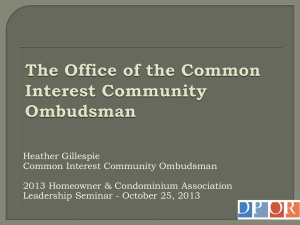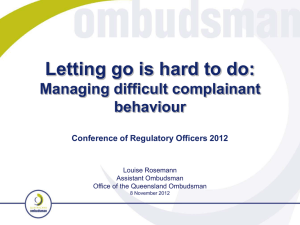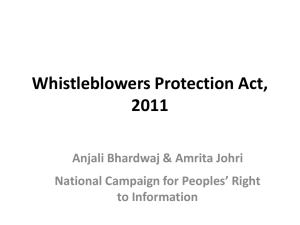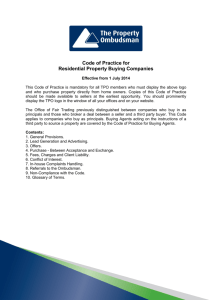Document
advertisement
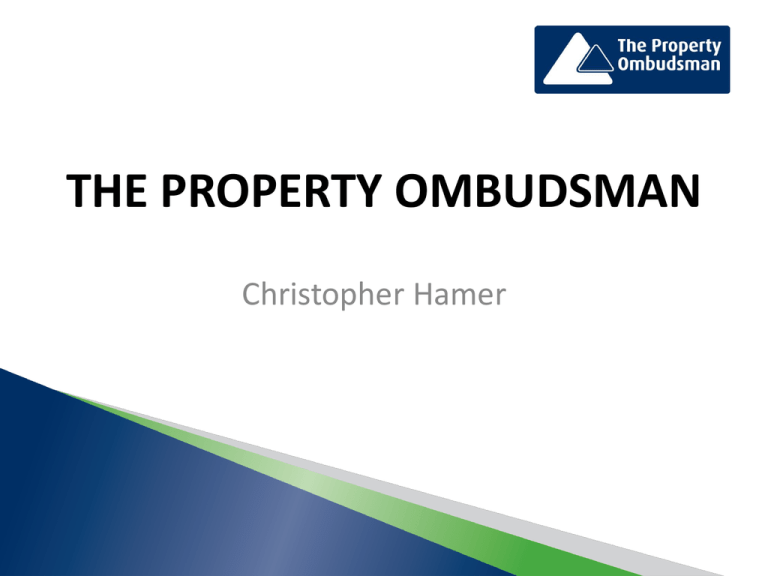
THE PROPERTY OMBUDSMAN Christopher Hamer Consumer Action Monitor Research Making the problem right 74% An apology 44% Financial compensation 27% Good complaints handling can increase operating profits by between 2% and 3% By lessening the time spent on complaints Re-allocation of resources to more commercial activities Enhance reputation of the firm Data collected from complaints can be a source of management information to identify areas for commercial improvement What can you do to stop complaints arising Communication and understanding Keep records Transparency, clarity of fees, commitments Deal with the dissatisfaction Meet any promises made to consumer or explain why you can’t Definition of a complaint ‘An expression of dissatisfaction, whether oral or written, and whether justified or not, from or on behalf of an eligible complainant about the provision of, or failure to provide a service’ Handling the complaint Structured approach to complaints handling Somebody not involved in the complaint If you’ve done something wrong admit it Clear explanation of your stance Adhere to a reasonable timescale Keep the consumer informed Learn from the complaint Likely areas of disputes Fees, Premiums Description of items Conduct of the Auction Failure to act on sellers instructions General service matters He said this… I said that… The mystery of the missing plate… An elderly client has made a complaint because a plate that she says was collected for delivery to your showroom did not appear in the lots that you sold. The client is seeking compensation for the lost plate, but you have no record of receiving it. The client is also upset that her telephone calls to your office have been ignored. What is your response? What other information might you need? What do the TPO general membership obligations say? You must provide a service consistent with fairness, integrity, and best practice. You should not take advantage of consumers because of their age or any other vulnerability. You must keep clear and full written records and produce them when required. What would your response be if… You had no record of the items collected from the client’s home? Your record of the items collected from the client matched the lots that were sold? The client had been telephoning your offices several times a day to discuss the missing plate? Case study… An elderly woman had decided to sell some furniture from her home at auction. When it came for the furniture to be collected, the Complainant had decided to add some ornaments to the items to be sold, including an ornamental plate. The Complainant alleged that the auction house had lost this plate, but this was denied by the auction house. The Ombudsman found that although a receipt had been prepared for the items collected from the Complainant, this had not been fully itemised, and the auction house had acknowledged taking delivery of some items not appearing on that receipt. Although the Ombudsman could not conclude that the auction house had lost the plate, it was considered that the auction houses failure to maintain full written records had allowed the dispute to arise. The Ombudsman also criticised the auction house for their approach to the complaint, as it was apparent that several telephone calls made by the Complainant had not been returned, and that the auction house had not made proper allowance for the Complainant’s age and relative lack of experience. The Ombudsman made a compensatory award of £100. Key points… Keep full written records of all transactions. The onus is on you as the professional party to be able to evidence your actions. Treat all consumers fairly and with courtesy. Act with integrity, and in accordance with best practice. Be aware that some consumers may be vulnerable, and take special care in your dealings with them. Misleading marketing A buyer who purchased a plot of land at auction has made a complaint because, having purchased the land, it became apparent that the plot was contaminated with oil and solvents. The buyer alleges that he was misled by you as the contamination of the land was not disclosed to him. The buyer is seeking compensation in the sum of half the sale price. What is your response? What other information might you need? What do the TPO general membership obligations say? You must always act within the law in the conduct of your business. You must not engage in any banned practice, misleading practice, or misleading omission as defined in the Consumer Protection from Unfair Trading Regulations (the CPRs). You must ensure that all advertising and marketing material is honest, decent, and truthful. Consumer Protection from Unfair Trading Regulations 2008 Covers information which would affect an average consumer’s transactional decision. Relevant information should be provided at the earliest appropriate opportunity. Information provided must not be misleading, and relevant information must not be omitted. Includes information which you should reasonably be aware of, not just information of which you are aware. What would your response be if… The seller had advised you when completing their legal pack that the land was not contaminated? You were aware that the land had been used as a commercial garage? The seller had set a reserve higher than the guide price stated in your advert? Case study… A buyer had purchased a parcel of land at auction, and later complained when it became apparent that the land was contaminated by a quantity of buried asbestos. The buyer considered that the auction house instructed to sell the land ought to have been aware of this contamination, and disclosed it to him. The agent contended that they had been unaware of the contamination. Evidence submitted by the buyer in this instance indicated that the contamination of the land was historic, and had arisen as a result of an unauthorised use of the land. The seller of the land had advised the agent that the land was not contaminated, and there were no visible signs of contamination above ground. In such circumstances, the Ombudsman considered that the agent was reasonably entitled to rely on the information provided by the seller as there was nothing to put the agent on notice that such information was inaccurate. The Ombudsman did not support the complaint. Key points… Take all reasonable steps to ensure that the information you provide about an item, land or property you are instructed to sell is accurate and not misleading. Double-check any information provided by a seller that you think may be incorrect. Don’t omit or withhold information you think potential buyers may find off-putting. Legislation Existing • Consumer Protection from Unfair Trading Regulations 2008 Recent • • • • Enterprise and Regulatory Reform Act Consumer Contract Regulations TPO Codes of Practice ASA Ruling on reserve prices Consumer Protection from Unfair Trading Regulations 2008 Consumer Protection from Unfair Trading Regulations 2008 Situated on the cliff top with uninterrupted views over Poole Bay stretching from the Isle of Wight in the East across to the Isle of Purbeck in the West. The apartment benefits from 3 bedrooms, 2 bathrooms, fully fitted kitchen, lounge with access out on to the patio and direct access down to the beach. The perfect place to unwind and enjoy watching the sunsets. Thank you The Property Ombudsman Milford House 43-55 Milford Street Salisbury Wiltshire SP1 2BP www.tpos.co.uk Twitter: @TPOmb Questions?

